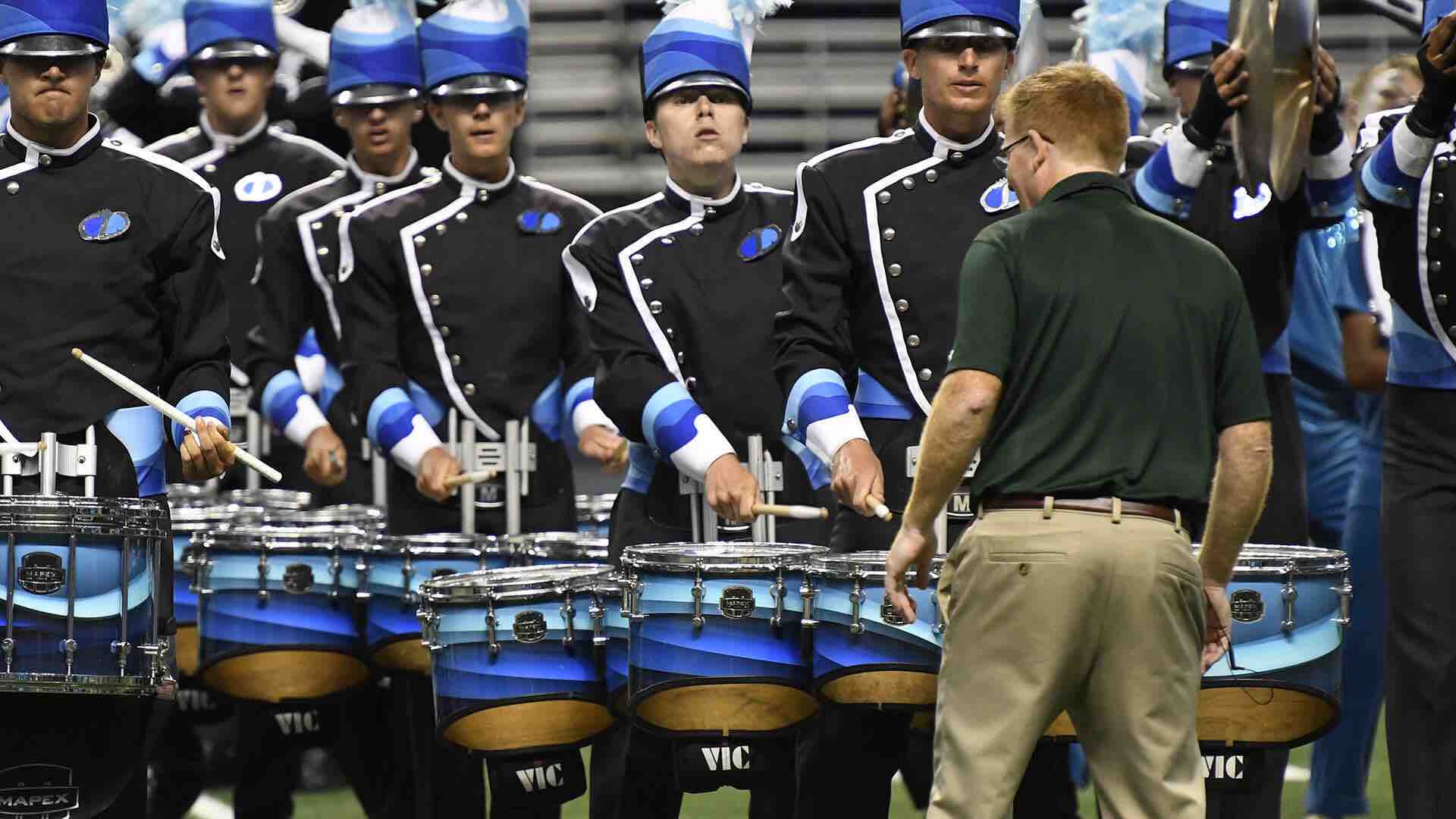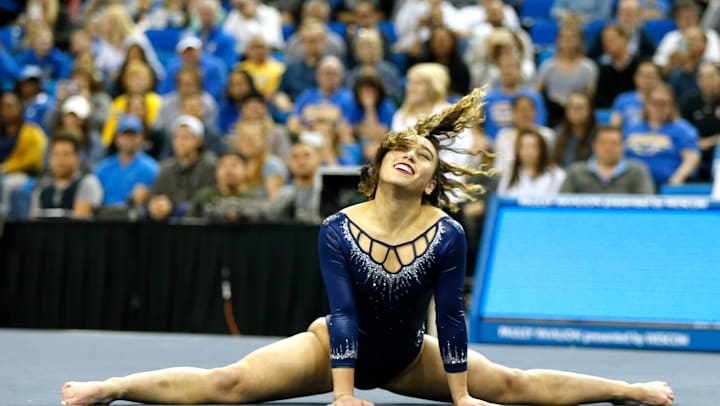

To Compete or Not to Compete: That is the Question by Charley Poole, Jr.
A Monster Drumming Article
By Charley Poole

The question as to whether competition is an asset or liability in music performance and instruction is one that I have heard for over 50 years. Some feel that it promotes continual growth and development while others argue that it is an artificial stimulus of which we should be free. Let’s take a closer look at the pros and cons of both sides.
The Pros:
1. Personal Commitment and Accountability

For 60 years now, I’ve served as an individual soloist, corps member, music educator and adjudicator of various music pageantry organizations. I started competing in individual contests at the age of 10, was the Connecticut State Champion at 14 and won the first of three National Championships at 16. In short, my entire musical experience has been within the framework of musical competition. Just as commitment in a marriage is critical to long term success it is equally needed for development as a musician. The contest culture sharpened my commitment to my drumming and held me accountable to persistent diligence and discipline toward practice. Evaluated events have served as measuring sticks for growth and have brought me a lifetime of rewarding experiences.
2. Recruiting

It would be a mistake to not recognize that American society is sports and competitive centric. Americans are obsessed with competition. Look no further than high school sports. Each year thousands of kids are directed to join a variety of youth sports programs by overly enthusiastic parents. Membership in a competitive drum corps, high school marching band or percussion ensemble introduces students to music in an environment that is part of their already competitive culture.
In support, there has been an explosion of scholastic competitive percussion ensembles around the country in the past 20 years. Each year, over 200 ensembles compete at the Winter Guard International World Championships in Dayton, Ohio. But this represents just a fraction of the total number of high school units in the United States. There are over 60 circuit associations in the United States servicing thousands of students.
There can be no doubt that competitive percussion ensembles have become wildly popular with students and, in most high school music departments, are considered as co-equals with concert band, jazz band and choral elective options.
3. Constructive Input

As technology increasingly continues to become part of our lives, the world of competitive music has also seen its positive effects. Today, judges at most music contests and festivals use recorded commentary in adjudication. I welcomed and used this input as an effective teaching tool with my students. Students were always eager to hear “what the judges had to say.” From new information to reinforcement of concepts previously learned the judge commentary was an important resource. Through this innovation students hear directly from a variety of voices and receive valuable insights from recognized authorities. As a long term judge at these events I have assumed the role of counselor to assist the staffs in student development and to provide an impartial assessment.
4. Life Lessons

In addition to subject matter, public school teachers are asked to impart life skills learned in the classroom that will benefit students in the future. Competitive music programs are a perfect source for this knowledge. The positive traits of teamwork, unity of purpose, goal setting, cooperation, resiliency and leadership found in sports exist in these musical endeavors. My 20- year tenure as a high school marching band and percussion ensemble director revealed that beyond the musical benefits of membership, life lessons learned are meaningful and significant. There have been countless times that graduates have come back to relay how their experience in band or percussion ensemble have come in handy in later life.
The Cons:
1. Art for Art’s Sake

Opponents suggest that music should be performed solely for its artistic sake and that competition demeans its intrinsic value. Music is an intimate interplay between the performer and the audience. It is a deeply personal commitment to music that results in a spiritual quality rarely found in human experience. Any influence such as competition that detracts from this unique opportunity must be avoided.
Having a healthy attitude toward performance is a prerequisite for successful musical involvement.
Any competitive approach that pushes a “win at all costs” mentality runs the risk of destroying the most important aspect of music making: the inner satisfaction of artistic expression. The goal of competitive success must never become the rationale for performance.
We have all seen units led by overzealously competitive directors and teachers. There is a real danger in excessive emphasis on the search for the gold. Without restraint, chasing victory may result in member disenchantment. In the extreme, it may result in the reduction in participation in ensembles. Personal growth and musical development should never be limited to a competitive objective.
Conclusion:
So where do we go from here? Can. Can musical competition and development of the whole musician peacefully coexist? To answer this question I go outside of the music world for the answer. Similar to music competitions the Olympics holds several events that fall under subjective adjudication. Gymnastics is a fair comparison.

Perhaps the most dramatic example of the positive and negative aspects of artistic competition is Katelyn Ohashi, the elite level gymnast. Throughout her junior career Katelyn was the dominant competitor of her era, outdistancing the greatest of all time, Simone Biles. The pressure to perform at the highest level and the win at all costs focus ultimately led to her athletic fall from grace. As she stated, she “hated herself and the sport that was her life”. There was a time where she was on top of the world only to fall to its depths.
Ultimately, she enrolled at UCLA and returned to the gym, however, under the guidance of Coach Valerie Kondos she discovered a renewal of her former passion. Coach Kondos emphasized the whole person and the importance of performing for its inner joy. She would never discuss gymnastics with Katelyn outside of the gym, but rather all other aspects of her life. She was coaching with a genuine holistic approach. The effect was stunning. Performing her floor exercise with a rediscovered energy and unbridled enthusiasm and creativity, it was viewed by millions on Youtube and resulted in her being crowned NCAA Champion in her senior year and final competition.
Personal Poole Note:
In my teaching I have seen the positive aspects of the contest (accountability, diligent practice techniques, teamwork qualities and recruitment success) without detracting from the total experience. As with most things in life it is a matter of balance. Finding that balance is the sole responsibility of the teachers and directors of competitive ensembles. It is absolutely vital that proper messages be delivered to the membership. Over time I settled on the following guidelines:
- Develop a healthy attitude toward performance: inner satisfaction comes first and foremost;
- Control that which may be controlled: one’s performance level;
- One’s primary obligation is to communicate music to the audience, not an adjudicator;
- In competition you, the performer, dictate the level of play. One does not have control over competitors and their abilities on a given day;
- Do not allow the desire for victory to outweigh the pursuit of excellence.
I hope that this discussion has provided food for thought and perhaps some positive suggestions for your consideration. By following these simple rules needed balance is possible. Through positive messaging to the members the excitement and valuable aspects of musical competition may be experienced by your musicians without suffering the potential pitfalls of competition. There exists a middle ground which allows both sides of this debate to be served in a meaningful way.
We believe more people would have music and Drumming in their lives if only it were easier to find solid instruction and have time to practice.
Rhythm Monster has solved these issues by providing access to the world's best players and teachers via flawless streaming of thousands of video classes, original digital learning tools and a worldwide community of those who identify as Drummer.
You can be a Monster too, and we can show you how at no cost. Click below to Monster-up with a Free Membership, and you'll instantly have tons of awesome Monster Drumming classes, totally on us. Enjoy!
Ready to finally become a Monster Drummer?

Why Choose Us
Integer nisl odio, scelerisque
fermentum rutrum leo. Praesent sit amet sem aliquet, dapibus metus et, tempor sapien. Cras varius metus metus, ac tempor ex malesuada lacinia. Nulla facilisi. Integer ultrices, risus sed euismod rhoncus
orem leo egestas velit, id volutpat ex nibh a neque. Quisque orci metus
iaculis libero. Nam porttitor nisi sed elit dictum, sed rhoncus
ipsum luctus. Pellentesque viverra, diam ac euismod pharetra



